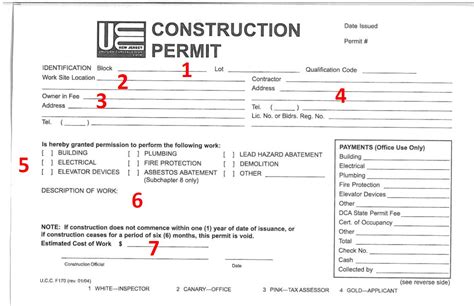As a homeowner or contractor in New Jersey, obtaining a construction permit is a crucial step in any building project. The permit application process can be complex and time-consuming, but with the right guidance, you can navigate it successfully. In this article, we will provide a step-by-step guide to help you understand the process and requirements for a NJ construction permit application.
Why Do You Need a Construction Permit?

Before we dive into the application process, it's essential to understand why a construction permit is necessary. A permit ensures that your project meets the minimum requirements of the New Jersey Uniform Construction Code (NJUCC) and local ordinances. It also helps to protect the health, safety, and welfare of the public by ensuring that buildings are designed and constructed to withstand natural disasters, fires, and other hazards.
Types of Construction Permits
There are several types of construction permits in New Jersey, including:
- Building permit: Required for any new construction, addition, alteration, or repair of a building.
- Electrical permit: Required for any electrical work, including installations, repairs, and replacements.
- Plumbing permit: Required for any plumbing work, including installations, repairs, and replacements.
- HVAC permit: Required for any heating, ventilation, and air conditioning work.
Step 1: Determine If You Need a Permit

Before starting your project, you need to determine if you need a permit. You can check with your local building department or consult the NJUCC to determine if your project requires a permit. Some projects that may not require a permit include:
- Minor repairs, such as replacing a roof or siding.
- Cosmetic changes, such as painting or installing new trim.
- Installation of finished flooring, such as hardwood or carpet.
However, if you're unsure whether your project requires a permit, it's always best to err on the side of caution and contact your local building department.
Step 2: Gather Required Documents
Once you've determined that you need a permit, you'll need to gather the required documents. These may include:
- A completed permit application form.
- A detailed description of the project, including materials and methods.
- Plans and specifications, including drawings and diagrams.
- Proof of ownership or authorization to perform the work.
- Payment for the permit fee.
Step 3: Submit Your Application

Once you've gathered all the required documents, you can submit your application to your local building department. You can usually submit your application in person, by mail, or online, depending on the department's policies.
Step 4: Wait for Review and Approval
After submitting your application, it will be reviewed by the building department to ensure that it meets the requirements of the NJUCC and local ordinances. This process can take several days or weeks, depending on the complexity of the project.
Step 5: Schedule an Inspection

Once your application has been approved, you'll need to schedule an inspection with the building department. The inspector will verify that the work has been completed in accordance with the approved plans and specifications.
Step 6: Obtain a Certificate of Occupancy
After the final inspection, you'll be issued a certificate of occupancy, which confirms that the building is safe for occupancy. You'll need to display the certificate in a conspicuous location, such as the building's entrance.
Gallery of Construction Permit Images





Frequently Asked Questions
Do I need a permit for a minor repair?
+It depends on the type of repair. Minor repairs, such as replacing a roof or siding, may not require a permit. However, it's always best to check with your local building department to confirm.
How long does it take to get a permit?
+The processing time for a permit can vary depending on the complexity of the project and the workload of the building department. It's best to check with your local building department for an estimated timeframe.
What happens if I don't get a permit?
+If you don't get a permit, you may be subject to fines and penalties. Additionally, if the work is not done to code, it can pose a safety risk to the occupants of the building.
By following these steps and understanding the requirements for a NJ construction permit application, you can ensure that your project is completed safely and in compliance with local regulations. Remember to always check with your local building department for specific requirements and guidelines.
